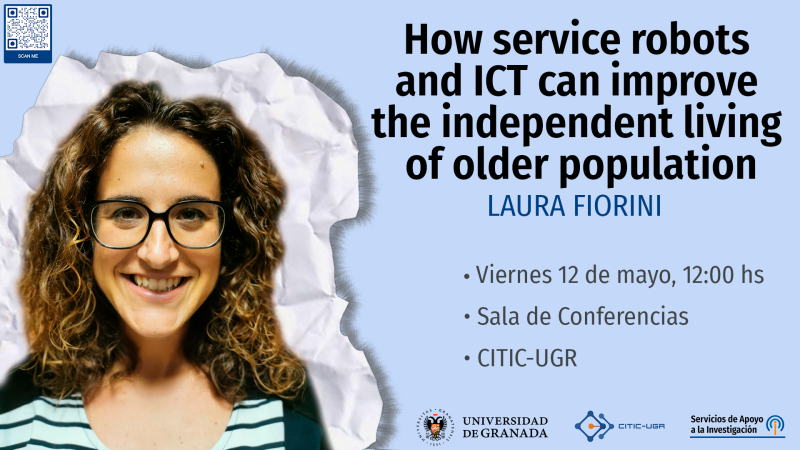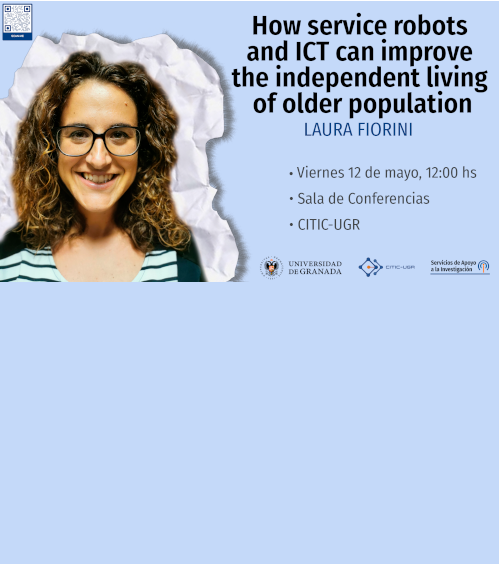

- Ponente: Laura Fiorini.
- Fecha y hora: viernes, 12 de mayo de 2023, a las 12:00 horas.
- Lugar: Sala de Conferencias del CITIC-UGR.
- Organiza: Centro de Investigación en Tecnologías de la Información y las Comunicaciones de la Universidad de Granada (CITIC-UGR).
- Contacto: Ignacio Rojas Ruiz y Javier Medina Quero.
Abstract: Social robots are entering in our houses and hospitals; therefore they should be endowed with advanced and personalized interaction capabilities thus to adapt to the dynamic external environments and the changing needs of frail citizens. Additionally, social robots should be able to cooperate interactively with formal caregivers as well as clinicians thus shifting from a care model where the frail user interacts with the robot to care models where also the clinicians/formal caregivers are also involved at different levels, according to the application. Indeed, the data acquired from the robots can be used by the robots to personalize the interaction and by the clinician to monitor the status of the users.
Biography: Professor Laura Fiorini is an Assistant Professor at the Department of Industrial Engineering of the University of Florence and is member of the Joint Assistive BioRobotics lab between University of Florence and Scuola Superiore Sant’Anna. She received the M.Sc. Degree (Laurea Specialistica) in Biomedical Engineering at University of Pisa in 2012 within the Thesis on Surgical Robotics. She also works as a Research Assistant at the Dirpolis Institute and The BioRobotics Institute of Scuola Superiore di Studi Universitari e Perfezionamento Sant’Anna (SSSA). She obtained a Ph.D. in Biorobotics at the BioRobotics Institute.
Resumen: Los robots sociales están entrando en nuestras casas y hospitales, por lo que deben estar dotados de capacidades de interacción avanzadas y personalizadas para adaptarse a los entornos externos dinámicos y a las necesidades cambiantes de los ciudadanos frágiles. Además, los robots sociales deben ser capaces de cooperar de forma interactiva con los cuidadores formales y los médicos, pasando así de un modelo de atención en el que el usuario frágil interactúa con el robot a otros en los que también participan los médicos y los cuidadores formales a distintos niveles, según la aplicación. De hecho, los robots pueden utilizar los datos adquiridos para personalizar la interacción y los médicos para supervisar el estado de los usuarios.
Biografía: La profesora Laura Fiorini es catedrática adjunta del Departamento de Ingeniería Industrial de la Universidad de Florencia y miembro del laboratorio conjunto de bio-robótica asistencial entre la Universidad de Florencia y la Scuola Superiore Sant'Anna. Obtuvo el máster (Laurea Specialistica) en Ingeniería Biomédica en la Universidad de Pisa en 2012 con una tesis sobre robótica quirúrgica. También trabaja como asistente de investigación en el Instituto Dirpolis y en el Instituto de BioRobótica de la Scuola Superiore di Studi Universitari e Perfezionamento Sant'Anna (SSSA). Obtuvo un doctorado en Biorobótica en el Instituto de BioRobótica.